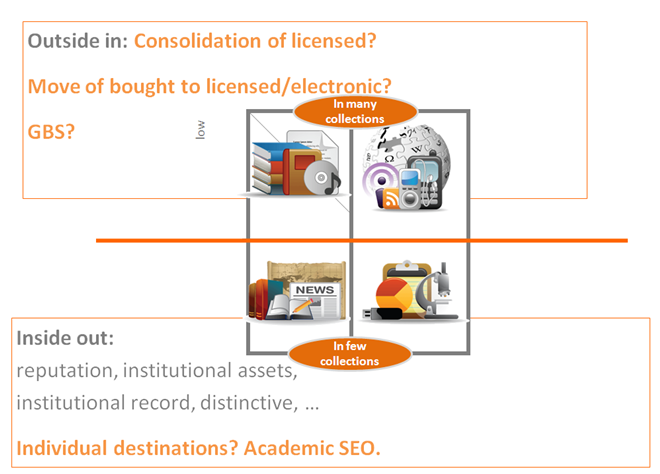I have been using this phrase, outside-in and inside-out, to discuss a contrast in information management practices that is becoming more important. Here is how I spoke about it a little while ago in these pages:
Think, for example, of a distinction between outside-in resources, where the library is buying or licensing materials from external providers and making them accessible to a local audience (e.g. books and journals), and ‘inside-out’ resources which may be unique to an institution (e.g. digitized images, research materials) where the audience is both local and external. Thinking about an external non-institutional audience, and how to reach it, poses some new questions for the library. [Outside-in and inside-out]
And here is how I have been talking about it in presentations in the context of the ‘collections grid‘.

‘Below the line’ are digitized materials (special collections, slides, etc) and the digital outputs of research and learning practices. Here a set of common interests emerge, in terms of digital library infrastructure, management of unique materials (something of course archives and museums have always done), disclosure to the outside world, and so on. This requires a new set of skills and orientations and a new way of interacting with clients.
I was reminded of this when reading an interesting post by Mark Dahl earlier where he talks about this shift in concrete terms. He notes the slow diminishment of ‘above the line’ activities:
As content shifts to the network and as discovery is disintermediated from the library, the work needed to support the library’s traditional roles as buyer, archiver, and gateway to information is slowly diminishing. [code4lib NW: digital initiatives presentation]
He then discusses several ‘thematic digital projects’ where faculty are working with digital resources to enhance teaching, learning and research. One example is ‘accessCeramics: a contemporary ceramics image resource‘ a collaboration between the Library and the Art Department at Lewis and Clark College, where the author works.
He sees a role over and above the creation and management of document- or image- based repositories we have seen emerge in recent years, and which I mention above.
But I think there are more interesting opportunities when we actually wade out into the messy world of teaching and research and offer up our expertise at organizing information. A way of doing this is to establish some kind of a digital initiatives program that faculty can engage with directly. We see this at large institutions such as University of Virginia and Columbia, but also now increasingly at liberal arts colleges like Hamilton, The University of Richmond, and Kenyon. The programs at these institutions in one way or another offer support to faculty for teaching or research related digital projects. [code4lib NW: digital initiatives presentation]
(Incidentally, given the University of Virginia is mentioned, it might be appropriate to point to the Scholars’ Lab.)



